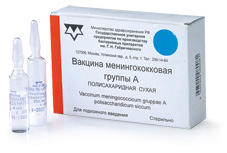Meningococcal vaccine – MCV4 vaccine
What is meningococcal disease?
Neisseria meningitidis – bacteria, that can cause an infection in the body. Very dangerous for humans is infection of the meninges. Shell – membrane, that surrounds the brain and spinal cord. Bacterial infection of the meninges, known as bacterial meningitis, can cause death within a few hours. Rapid diagnosis and treatment of disease are vital.
Disease, usually, is transmitted by direct contact with secretions from the mouth or throat of an infected person (eg, by kissing), and, usually, is not transmitted through casual contact.
The disease most commonly occurs in the following population groups:
- Children aged less than one year;
- Individuals with certain diseases and disorders (eg, the absence of spleen);
- Students, who live in hostels – increased risk of disease.
About 10% -15% living with dying. Yet 11% -19% lose an arm and a leg, become deaf, faced with the problems of the nervous system, become intellectual disabled or suffer convulsions or strokes.
Symptoms of meningitis:
- Heat;
- Headache;
- Very strong pain in the neck;
- Red or purple skin rash;
- Cyanosis (bluish skin color);
- Nausea;
- Vomiting;
- Photophobia (sensitivity to bright light);
- Drowsiness;
- Confusion.
Symptoms in newborns and infants is difficult to distinguish. They may include:
- Inertia;
- Unexplained high or low body temperature;
- Irritability;
- Vomiting;
- Jaundice;
- Poor appetite or refusal of food;
- Stiffness or bulging soft space between the bones of the skull;
- Difficulty waking up.
If the treatment is immediately, more 90% survive. Treatment may include:
- Antibiotics;
- Corticosteroids;
- Replacement fluids – fighting hypotension.
What is meningococcal vaccine?
There are two types of meningococcal vaccine:
- Meningococcal a combined vaccine (MCV4) – in the form of injections into the muscle, preferable for people aged 55 years and younger;
- Polisaharidnaya meningococcal vaccine (MPSV4) – in the form of injections under the skin, preferred for adults aged 56 and older.
Both vaccines are produced from parts of meningococcal bacteria, and do not contain live bacteria.

When and who should be vaccinated meningococcal vaccine?
Routine vaccination
MCV4 vaccine once introduces children 11-12 years with repeated dose at age 16 years.
Three doses are required for teenagers (11-18 years), people living with HIV:
- Two doses with a difference in two months in 11 or 12 years;
- Revaccination at the age 16 years.
Schedule for adolescents, that late vaccinated:
- If the first dose is introduced between 13-15 years, Repeat dose injected into the 16-18 years;
- If the first dose is entered after the 16 years, the revaccination is not needed.
Vaccination for meningococcal vaccine for people at increased risk
Vaccination is in need of a group of people, who have an increased risk of developing meningitis:
- Students, who live in hostels;
- Laboratory workers;
- Soldiers;
- People, that travel or live in areas, where the elevated risk of contracting meningococcal disease;
- Patients with problems related to their functioning or no spleen;
- Patients with immune system disorders (eg, shortage components of the complement system);
- People, who have been exposed to infection during the epidemic meningitovoj.
To be fully protected, little children 9-23 of the month, and other people, who have certain diseases should receive two doses of vaccine.
People with a high risk of the disease need revaccination every five years.
Risks, Related Meningococcal vaccine
Meningococcal vaccine, like all vaccines, can cause serious problems, such as heavy allergic reactions. The risk of severe injury or death is extremely small.
Small problems, associated with the vaccine include redness or pain at the injection site or a fever. Rarely do people, received MCV4 vaccine developed severe disorder of the nervous system called Guillain Barre syndrome.
Who should not be vaccinated against meningococcal disease?
Vaccination is prohibited in the following cases:
- There was a dangerous life an allergic reaction to a previous dose of the vaccine or its components;
- Moderate or severe illness. Waiting for recovery before the introduction of the vaccine;
- Guillain-Barre syndrome – you need to tell your doctor.
The vaccine also could be introduced for pregnant women. Nonetheless, effect of MCV4 vaccine to pregnant women has not been well studied. It should be used only when necessary.
What are the ways to prevent meningococcal disease in addition to vaccination?
Antibiotics may be given to people, staying in close contact with an infected person:
- Health care workers;
- Family members of the patient.
Quitting smoking can reduce the risk of meningococcal disease, particularly in adolescents and young people, who live in conditions of dorms.
What happens in case of an outbreak of meningococcal disease?
In the event of an outbreak, person, While in close contact with infected and persons with increased risk of disease should get the vaccine. For people, staying in close contact with the sick, antibiotics may be recommended.
